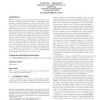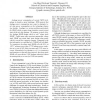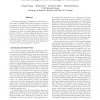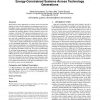94
Voted
FPGA
2004
ACM
15 years 6 months ago
2004
ACM
We consider active leakage power dissipation in FPGAs and present a “no cost” approach for active leakage reduction. It is well-known that the leakage power consumed by a digi...
105
click to vote
CASES
2004
ACM
15 years 6 months ago
2004
ACM
While the dynamic voltage scaling (DVS) techniques are efficient in reducing the dynamic energy consumption for the processor, varying voltage alone becomes less effective for t...
VLSI
2005
Springer
15 years 6 months ago
2005
Springer
Leakage power consumption of current CMOS technology is already a great challenge. ITRS projects that leakage power consumption may come to dominate total chip power consumption a...
121
click to vote
EMSOFT
2005
Springer
15 years 6 months ago
2005
Springer
Power leakage constitutes an increasing fraction of the total power consumption in modern semiconductor technologies. Recent research efforts have tried to integrate architecture...
89
Voted
ISLPED
2005
ACM
15 years 6 months ago
2005
ACM
Leakage power is one of the most critical issues for ultra-deep submicron technology. Subthreshold leakage depends exponentially on linewidth, and consequently variation in linewi...
91
Voted
ISLPED
2005
ACM
15 years 6 months ago
2005
ACM
As FPGAs enter the nanometer regime, several modifications are needed to reduce the increasing leakage power dissipation. Hence, this work presents some modifications to the FPG...
ISLPED
2005
ACM
15 years 6 months ago
2005
ACM
As transistors keep shrinking and on-chip data caches keep growing, static power dissipation due to leakage of caches takes an increasing fraction of total power in processors. Se...
DATE
2005
IEEE
15 years 6 months ago
2005
IEEE
In this paper, two packing algorithms for the detection of activity profiles in MTCMOS-based FPGA structures are proposed for leakage power mitigation. The first algorithm is a ...
116
Voted
CASES
2006
ACM
15 years 6 months ago
2006
ACM
Rising interest in the applications of wireless sensor networks has spurred research in the development of computing systems for lowthroughput, energy-constrained applications. Un...
115
Voted
ASPDAC
2006
ACM
15 years 6 months ago
2006
ACM
- One of the critical issues in MTCMOS design is how to estimate a circuit delay quickly. In this paper, we propose a delay modeling and static timing analysis (STA) methodology ta...




